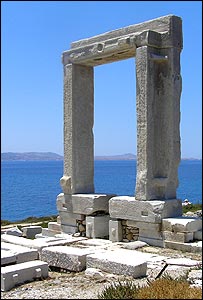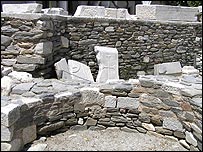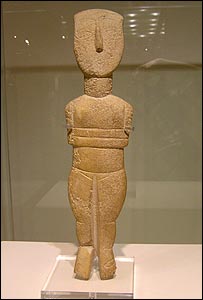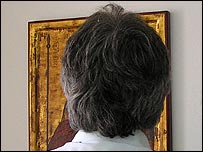 |
|
|
Greece Fights for its Lost Treasures |
|
|
The Greek American Herald
An untold amount of Greek heritage has been lost to international smugglers, but now Greece is fighting back, determined to bring its treasures home "Smuggling is a very big problem and it is becoming bigger by the day. Everybody in Greece is doing some kind of digging or looting somewhere." Yannis - the name he gives himself - is a key figure in the international smuggling network. In an exclusive interview for BBC Radio 4's Crossing Continents, conducted at a secret location, he revealed his insights. |
 |
|
"It starts at the top, from politicians down to ordinary people," he continued, "and the motivation is always money." "Everyone knows it's illegal. There's dirt on all layers of Greek society. I repeat: A lot of dirt!"
|
|
| Enforcement problems Greece has at least 3,000 museums and open-air archaeological sites, and about 20,000 shipwrecks. Protecting the huge number of sites and antiquities is difficult. Protecting the antiquities and stopping the looters has always been difficult. |
 |
| Greek laws governing the ownership of antiquities are in fact very strict: everything you find on Greek soil belongs to the state and must be registered. There's also the 1970 Unesco Convention on Cultural Property, which supports international co-operation on ownership. But in both cases the problem has been enforcement. Two recent scandals have focused Greek minds on protecting their property and on pursuing the looters. In spring this year, Gligoris and his team raided the Cycladic island homes of the American Marion True, a former antiquities curator at the J Paul Getty Museum in Los Angeles, and the home of the late shipping magnate Christos Mihailidis. Over 300 objects in total, allegedly unregistered, were seized and are being investigated. Ms True is currently on trial in Rome for allegedly conspiring to receive stolen antiquities for the Getty Museum. She denies all wrong-doing. Whatever the verdict, this is the first international trial of its kind in the trafficking of illegal antiquities. |
|
| Grey areas Yannis, the middleman turned police informer, told the programme how the network operates. Some of the Cycladic figurines can fetch millions of Euros "The looter often knows the middleman so he may smuggle to order. The antiquities then go abroad - usually first to dealers in Switzerland and Germany. This happens by lorry and by boat," he said. "Thousands of trucks leave Greece every day and the objects are hidden in boxes and food, like watermelons." He continued: "Some objects such as Cycladic figurines can fetch millions of Euros. They are among the most valuable antiquities in Greece today." |
 |
| When asked whether he accepted responsibility for his crimes, Yannis replied: "First of all, I am not a looter. I was a middleman. It's the state I blame and the many grey areas in the law. "Even if an object is ultimately declared 'legal', and has been bought via a big auction house or dealer, it has often arrived there via illegal digs and dealing. "Governments and museums all over the world are aware of this and often turn a blind eye. Some of the world's biggest museums have not explained how they got their acquisitions - so we have to assume that these objects have been smuggled," he said. Greece is now putting pressure on museums and collectors to return disputed artefacts. The international consequences of Greece's crackdown are huge. In July, the Getty Museum promised to return two statues. It is expected that more museums will follow suit. |
|
| Undercover work Success depends to a large extent on the police major, Yiorgos Gligoris, a man with a mission. How does he operate? "As with police all over the world, we work with our sources. We get tip-offs," he said. "Most of the time I pose as a buyer or dealer - which is why I work undercover and don't appear in public. |
 |
|
"I spent a long time studying Greek antiquities when I got this job. I have to know the prices on the market. I have to know how the looters think and act. "They must believe in me. It's the way you dress, the car you drive, the places you go. |
|
|
(Posting date 27 September 2006) HCS encourages readers to view other articles and releases in our permanent, extensive archives at the URL http://www.helleniccomserve.com/contents.html. |
|
|
|
|
2000 © Hellenic Communication Service, L.L.C. All Rights Reserved.
http://www.HellenicComServe.com |
|
